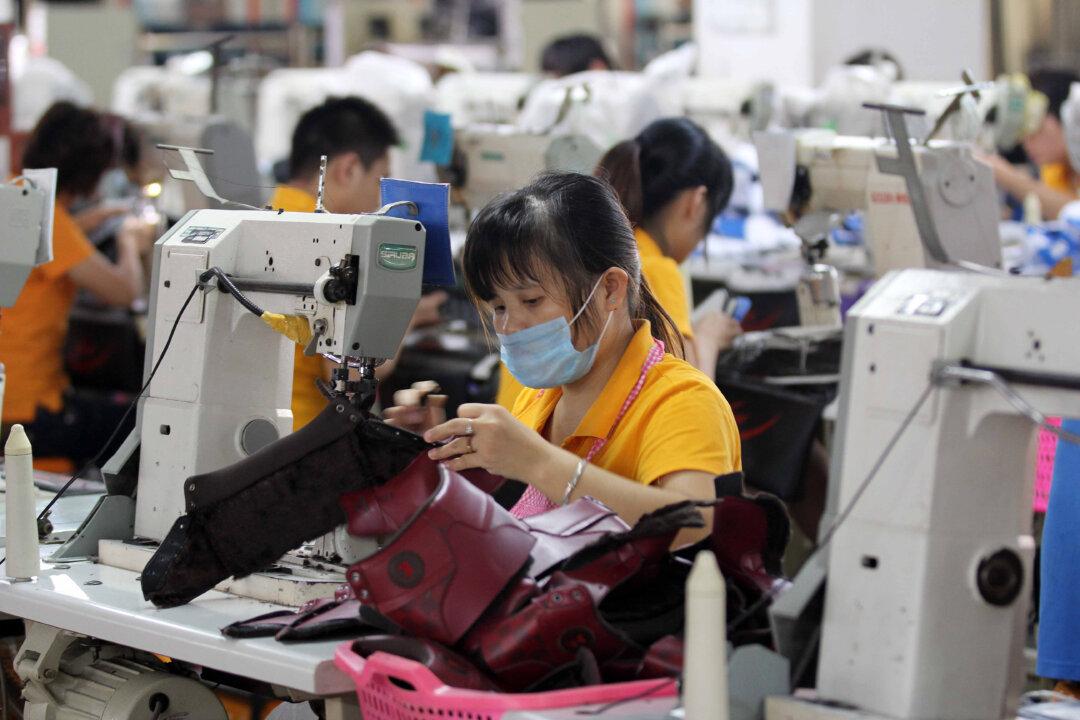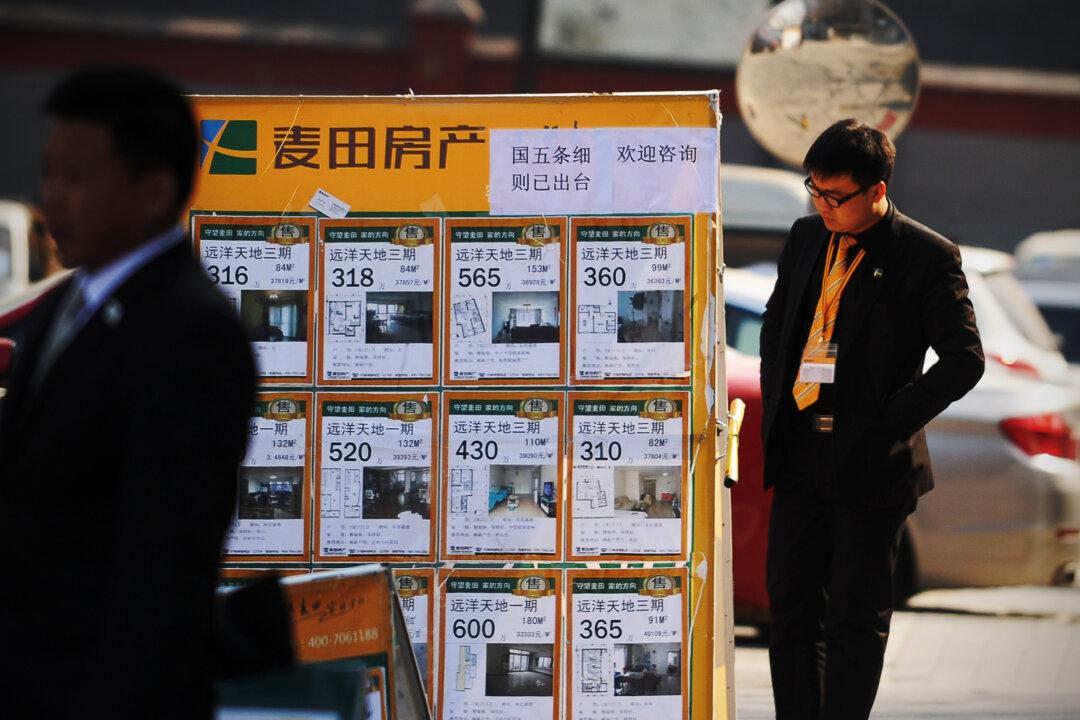A man stabbed and killed a traffic policeman in northern China’s Liaoning Province Saturday during a scuffle following a possible traffic offense, while other police stood by watching. Posts about the incident on popular Internet forums were quickly deleted by state censors, and calls to various police departments resulted in no information.
A Chinese blogger, who claimed to have been a witness, documented the incident with several photos.
The blogger said the scuffle began at about 1:00 pm on July 31 in front of the Archive Department Building in Dandong, Liaoning Province. About 10 minutes after the man had stabbed the police officer, an armored police car arrived. Two policemen came out of the car, but they did not arrest the killer. Instead, they simply observed the situation and dispersed the nearby crowd.
After another 10 minutes, another ten plus policemen arrived in several cars, but they too simply watched.
About 20 minutes later a police sniper was called in. The two sides were in a standoff for about ten minutes, then a policeman fired three warning shots from his hand gun at the killer from behind a police car. However, the killer did not give himself up and threw glass bottles to provoke the police.
A middle-aged man who appeared to know the killer attempted to reason with him. He also noticed that the stabbed policeman was still alive and called for other police to help save the wounded officer, but the killer then stabbed the wounded policeman two more times. At this point, police opened fired on the killer. Then, several police in plain clothes charged toward the fallen killer and violently hit him with metal shovels.
The killer was rushed by ambulance to a hospital, but the stabbed policeman was reported dead.
According to another blogger, the incident started when a man on a motorcycle ran through a red light, where upon the traffic police chased him. When they got to the Land and Resources Bureau, the two got into a fight. The policeman first kicked the motorcyclist and slapped his face. This infuriated the man, who then took a knife from the trunk of his motorcycle, and also grabbed another knife from a nearby fruit stand, and stabbed the policeman.
Some people posted treads on Internet forums discussing the incident. The threads were quickly deleted by state censors. Related posts on Baidu’s Tieba (a popular Internet forum) were closed and posts on Tianya’s forum (another popular site) were deleted.
When this reporter called the Zhenxing district police station in Dandong, the officer who answered the phone said that he was not allowed to answer questions and told the reporter to call the Dandong city police department instead. The reporter then called the criminal investigation brigade of Dandong city, but was given the same answer.
An officer who answered the phone at the Dandong city police department said he did not know about the incident. And a call to the external relation division of the police department was not answered.
Two years ago, an unemployed man named Yang Jia became a grassroots hero after he killed six police officers in Shanghai . Yang committed the murders in revenge for having been subjected to a police interrogation as a suspect in a bicycle theft. Yang was allegedly brutally beaten during a detention by Shanghai police, and as a result lost his sexual function. His appeal was initially ignored by authorities, before he took matters into his own hands.
Yang was tried behind closed doors and executed on Oct. 20, 2008. He gained widespread sympathy from the Chinese public who saw his case as a common example of people being forced to take justice into their own hands. Yang’s statement, “If you don’t give me an answer, I'll teach you a lesson” has become a motto for Chinese people disillusioned by police brutality and judicial injustice.
Read the original Chinese article.
A Chinese blogger, who claimed to have been a witness, documented the incident with several photos.
The blogger said the scuffle began at about 1:00 pm on July 31 in front of the Archive Department Building in Dandong, Liaoning Province. About 10 minutes after the man had stabbed the police officer, an armored police car arrived. Two policemen came out of the car, but they did not arrest the killer. Instead, they simply observed the situation and dispersed the nearby crowd.
After another 10 minutes, another ten plus policemen arrived in several cars, but they too simply watched.
About 20 minutes later a police sniper was called in. The two sides were in a standoff for about ten minutes, then a policeman fired three warning shots from his hand gun at the killer from behind a police car. However, the killer did not give himself up and threw glass bottles to provoke the police.
A middle-aged man who appeared to know the killer attempted to reason with him. He also noticed that the stabbed policeman was still alive and called for other police to help save the wounded officer, but the killer then stabbed the wounded policeman two more times. At this point, police opened fired on the killer. Then, several police in plain clothes charged toward the fallen killer and violently hit him with metal shovels.
The killer was rushed by ambulance to a hospital, but the stabbed policeman was reported dead.
According to another blogger, the incident started when a man on a motorcycle ran through a red light, where upon the traffic police chased him. When they got to the Land and Resources Bureau, the two got into a fight. The policeman first kicked the motorcyclist and slapped his face. This infuriated the man, who then took a knife from the trunk of his motorcycle, and also grabbed another knife from a nearby fruit stand, and stabbed the policeman.
Some people posted treads on Internet forums discussing the incident. The threads were quickly deleted by state censors. Related posts on Baidu’s Tieba (a popular Internet forum) were closed and posts on Tianya’s forum (another popular site) were deleted.
When this reporter called the Zhenxing district police station in Dandong, the officer who answered the phone said that he was not allowed to answer questions and told the reporter to call the Dandong city police department instead. The reporter then called the criminal investigation brigade of Dandong city, but was given the same answer.
An officer who answered the phone at the Dandong city police department said he did not know about the incident. And a call to the external relation division of the police department was not answered.
Two years ago, an unemployed man named Yang Jia became a grassroots hero after he killed six police officers in Shanghai . Yang committed the murders in revenge for having been subjected to a police interrogation as a suspect in a bicycle theft. Yang was allegedly brutally beaten during a detention by Shanghai police, and as a result lost his sexual function. His appeal was initially ignored by authorities, before he took matters into his own hands.
Yang was tried behind closed doors and executed on Oct. 20, 2008. He gained widespread sympathy from the Chinese public who saw his case as a common example of people being forced to take justice into their own hands. Yang’s statement, “If you don’t give me an answer, I'll teach you a lesson” has become a motto for Chinese people disillusioned by police brutality and judicial injustice.
Read the original Chinese article.



